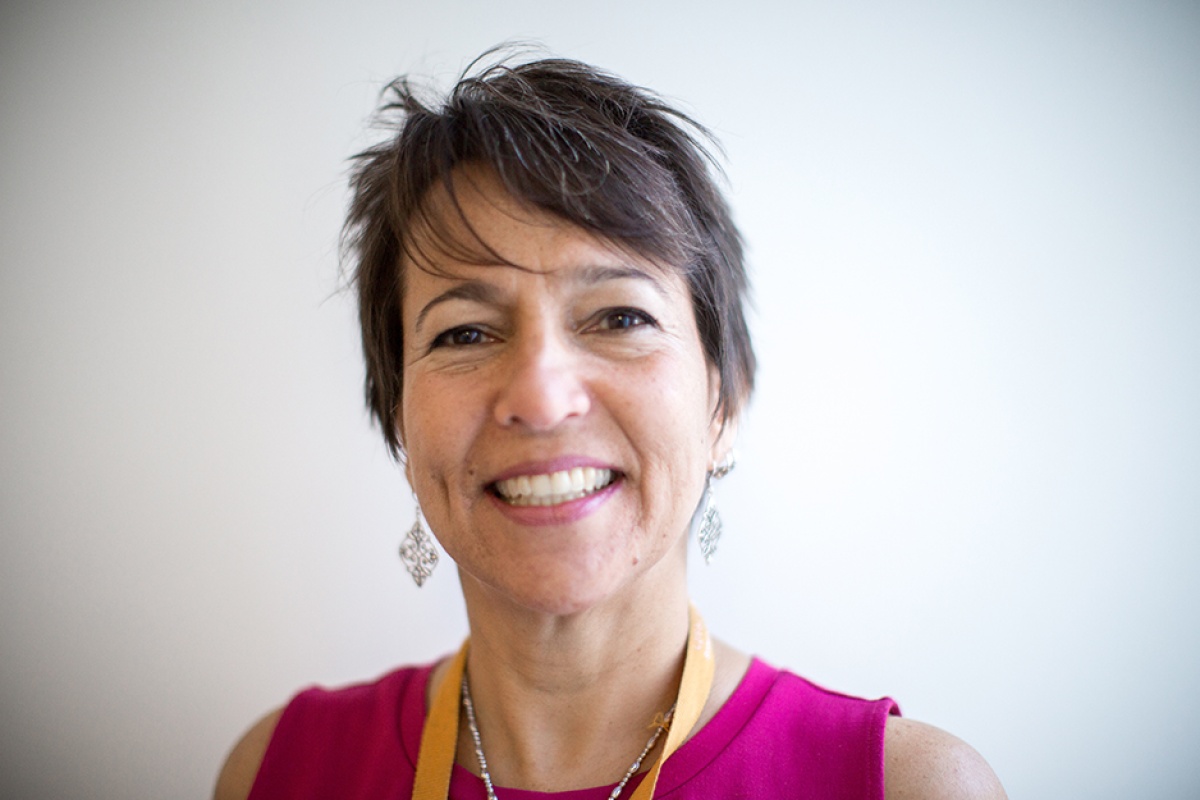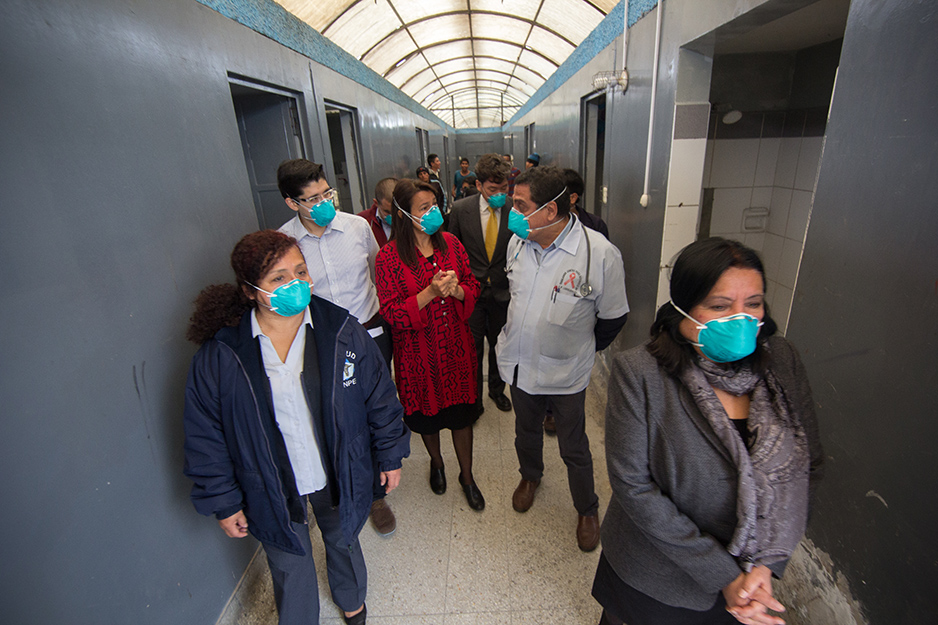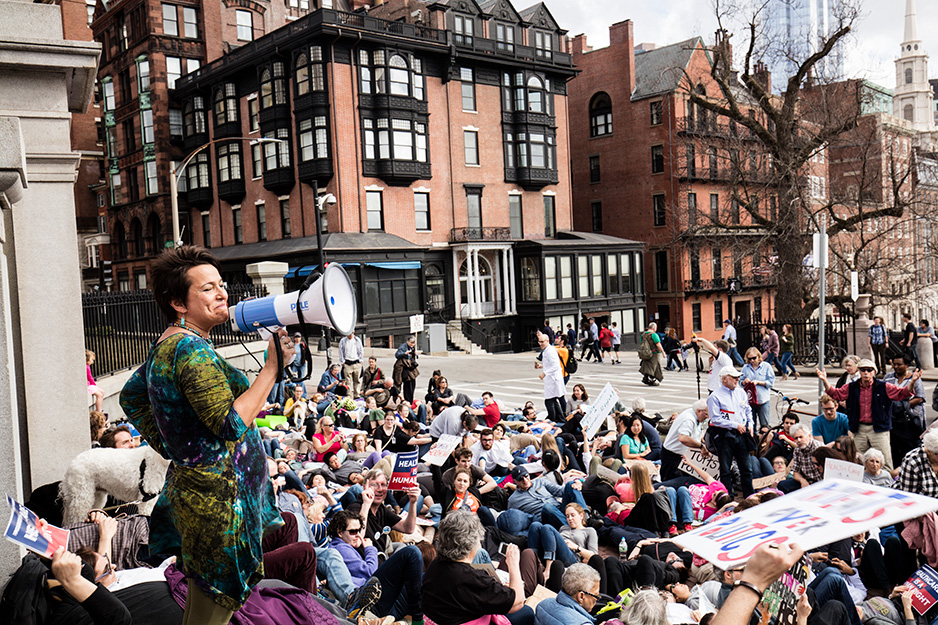Dr. Joia Mukherjee: PIH's Global Health Warrior
Posted on Apr 1, 2019

Dr. Joia Mukherjee is chief medical officer of Partners In Health. She was among four speakers at PIH's inaugural Evening for Equity on April 2 at the John F. Kennedy Presidential Library and Museum, where she spoke about her evolution as a doctor working in global health, and how we can work together to achieve universal health coverage. Watch a video of her talk HERE.
This story was originally published on December 8, 2017.
Dr. Joia Mukherjee doesn’t have much free time on her hands. In her words, she has “a day job, a night job, and a weekend job.” So when a representative from Oxford University Press asked if she would write an undergraduate textbook on global health, she inwardly scoffed, then politely declined.
But Mukherjee, Partners In Health’s chief medical officer and associate professor in the Department of Global Health and Social Medicine at Harvard Medical School, understands that “no” is never a final answer. She has heard the word plenty of times as an unabashed rabble-rouser who advocates for—and delivers—quality health care for the poor. So when the Oxford representative stubbornly persisted, she reconsidered.
The result is “An Introduction to Global Health Delivery: Practice, Equity, Human Rights,” a 14-chapter textbook published in November by Oxford University Press. Within 376 pages, Mukherjee outlines the history of the global health movement; talks about the staff, stuff, space, and systems necessary to provide high-quality health care (PIH’s mantra); and emphasizes the role that advocacy plays in building a larger community of globally minded citizens.

Mukherjee decided to write the book, she said, because she’s seen too many young people get excited about global health and begin courses on topics such as epidemiology and statistics, but then gradually feel removed from what first attracted them to the field: the idea of making the world more just. She remains convinced of the need to keep students interested and engaged, and wrote her book with that goal firmly in mind.
“We need a much, much bigger army of people raising their voices” about how health is a human right, she said.
Mukherjee, who is also an associate professor in the Division of Global Health Equity at Brigham and Women’s Hospital, sat down recently to talk about her book, the U.S.’s current health care battle, and the first steps toward pursuing a career in global health.
What do you hope this book will clarify for students interested in global health?
My main goal for writing the book is really to have young people understand that implementing global health projects together with people in affected countries is an act of solidarity and social justice. Global health ought to be about the delivery of care, not just prevention of disease. It’s about addressing the entire burden of disease, not just what’s easy or contagious. It really needs to address the social determinants, and understand why they are so unequal. You need a human rights approach, which involves civil society, engagement, and activism, but also involves supporting the public sector, because the guarantor of human rights is the government.
What is the difference between public health and global health?
If you have a vaccination program that has a 90 percent vaccination rate, public health would say, “Great, success!” But what global health ought to do is say, “Wow! Who are those 10 percent of kids who are not vaccinated, and why?” Those are the kids who are heads of households, whose parents have schizophrenia, who are starving. Those are the kids who live too far [from the clinic]. So that last 10 percent, that is the equity mission that ought to be baked into the human rights approach.
When I was a young person and in public health school, it really was about, “How do you get the biggest bang for your buck?” Not, “How do you question the number of bucks that you have?” That’s the difference really. Do you start from accepting $5 per capita? Or do you say, “We need to have people have good health care,” and then fight for the money?
That’s what the AIDS epidemic taught us. The whole time the global AIDS pandemic was just felling people left and right, and the public health community was saying, “prevention.” Meanwhile, we had the drugs for the global pandemic. I want to differentiate ourselves as people who want health equity and health justice, which means delivery of care. It doesn’t mean no prevention; it means prevention, treatment, and care.

What other lessons can we learn from HIV activists in pushing for health care for all?
For me, the biggest lesson was that advocacy works. Then you have to unpack, what is advocacy? From a Partners In Health standpoint, we lead with service. That’s our sweet spot. We can show that it’s possible—whether it’s a cholera vaccine, MDR-TB treatment, hepatitis C treatment, cancer care. We give the movement for the right to health examples of success.
The second part is that the people who ought to lead the charge are local. Haitians teaching Haitians, and Rwandans working on research. Building capacity means building true intellectual capacity.
How has people’s view of universal health care changed here in the United States in recent years?
I gave a talk in 2014 on Boston Common about health care as a human right. There were 30 people there. It was tragic to me then that, in the richest country in the world, people don’t even think of health as a human right. Well, I’ll tell you, that has changed. This is when we have to realize we’re winning. If you have a rally for health as a human right, now, you can get 100 people, 200 people, 1,000 people, 4,000 people. Now, everyone is saying health is a human right. Even politicians are saying health is a human right—and not just U.S. Senator Bernie Sanders. We have actually captured some momentum here, despite the challenges that lie ahead.
Some people in the United States criticize PIH’s mission and ask why we advocate for quality health care abroad, when people are suffering here. How do you respond?
Human beings to me are not more or less human depending on the nation state in which they were born. I want everyone to have access to health care. I know this from my own experience as a mother—what the difference was for my son, versus the son of a poor mother who was cleaning the basement at the Brigham and Women’s Hospital. She worried she would lose her job, that she didn’t have enough time off. Social forces, the conditions of our birth, should not be a life-and-death dilemma for anyone, anywhere.
There’s another important thing we can learn from the AIDS activist movement: The people who fought for accelerated scientific trials for AIDS and treatment access in the United States, they didn’t stop fighting. They didn’t say, “We have AIDS. Now we have treatment, so we can relax.” They kept fighting and said, “This is a human right; this is about all humanity.” Americans and Europeans fought in solidarity with their brothers and sisters from Africa, Asia, and Latin America. Their voices were better and louder together.

We often talk about the social determinants of health—the social, economic, and political context of each patient. Why is that link important to understand?
In medical school, I was taught about any variety of genetic mutations that cause disease. We were taught about different behaviors, like smoking, as the cause of disease. But the thing that actually determines whether you live or die in the United States, the one factor that’s most important, is zip code. How is it that we teach about health care and don’t address the elephant in the room, which is zip code?
It’s at our own peril that we look only at the biomedical model of illness, and not at what we call the biosocial model—meaning political, economic, and historic linkages with health. You can’t look at malnutrition in Haiti and not understand land tenure. Most poor Haitians do not own land; they’re sharecroppers. How can you understand the AIDS epidemic in South Africa if you don’t understand apartheid and how it tore families apart? I say in the book that you have to really walk with people, have a deep understanding, and read broadly to really get what’s going on.
Could you share some lessons learned from patients over the years?
I dedicate the book to a couple of patients whose lives were lost in the nihilistic public health paradigm I was taught as a student. One was a little girl who was starving and sick. I weighed her when I was a medical student, gave her mother education about the food groups, and sent her home. She died. I’m quite sure that her mother knew exactly what to feed her. She didn’t have food.
Similarly, I took care of AIDS patients before there was antiretroviral treatment in Peru—patients who, in the era of treatment in a second-world country, died for lack of medicines. I treated them for resistant TB without antiretroviral therapy, and they died.
I think about those patients for whom the conventional wisdom was modern medical care is just too expensive, and I always contrast that with my own experience with my son. He had cancer and very extensive surgery. It was extremely expensive, and he’s a very healthy 11-year-old boy now. And I think, if he has that access, why is it that I couldn’t give food to that little girl? What is wrong with the world? That is what I think about a lot. And that’s why I ended up finally agreeing to write this book. Because I thought, “We need more people to care. We need more people to make these problems their own problems.”
What advice would you provide students interested in pursuing global health?
Get close to poor people in your own country. Much of my earliest work was being a Big Sister, working in a shelter for victims of domestic violence, working in a soup kitchen—and talking to people. Learning to listen and to learn from the experiences and lives of poor people. That is the most important thing, because that proximity to suffering allows you, even as a person with privilege, to develop humility and deeper engagement with the problems.
That’s step one. Step two is trying to inform yourself about the causes. Be inquisitive about the why, the history.
Any experience you can have abroad that you can be of service to people is going to be important, even if it is extremely basic. You don’t have to go as an expert. I’m not a religious person, but I liken it to washing the feet of the poor. Just be present. Listen. Be humble. That way you see if you like this work. Is it for you? Is this what you want to be, you want to do?
Take risks early. It’s easy to get all wrapped up into how much money you owe. But you’re still from a rich country. You will pay back your debt eventually. Take volunteer jobs, and before you have a family. Those are the things that really transform who you are and will open the door for other opportunities.
If I have a job open on my clinical team somewhere in the world, I’m much more likely to take somebody who’s worked abroad than somebody who has 15 degrees. Don’t keep adding degrees because you don’t know what you want to do. Get out there and do it. And if your parents question it, they can talk to me.

